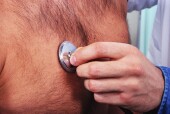
MONDAY, April 1 (HealthDay News) — Timely follow-up care with a doctor after going to an emergency department with chest pain significantly reduces the risk of heart attack or death among high-risk patients previously diagnosed with heart disease or diabetes, a new study says.
Chest pain is the most common reason patients go to the ER, accounting for more than 5 million visits each year in the United States.
In this study, researchers analyzed data from nearly 57,000 adults, average age 66, in Canada who were diagnosed with chest pain in an ER and had been previously diagnosed with heart disease or diabetes.
Only 17 percent of the patients were evaluated by a cardiologist within a month after their ER visit, 58 percent saw only a primary care doctor, and 25 percent had no doctor follow-up, according to the study published April 1 in the journal Circulation.
Compared to patients who did not seek additional care within a month after their ER visit, those who followed up with a cardiologist were 21 percent less likely to have a heart attack or die within a year and those who saw a primary care doctor had a 7 percent lower risk.
Patients treated by cardiologists received more testing and treatment within 100 days of their ER visit and had the best outcomes. Patients seen by cardiologists were 15 percent less likely to have a heart attack or die within a year than those who were seen by primary care doctors.
Patients who did not seek any follow-up care whatsoever within a month had the worst outcomes.
The findings show the need to improve follow-up with high-risk chest pain patients after they leave the ER, said study senior author Dr. Dennis Ko, a cardiologist at Sunnybrook Health Sciences Center, in Toronto.
“Being discharged from the emergency department is reassuring for patients, but it is critical that they follow up with their doctor to reduce their risks of future heart attacks or premature death,” Ko said in a journal news release. “Patients need to advocate for themselves and physicians need to be more diligent about arranging follow-up care.”
More information
The MedlinePlus Medical Encyclopedia has more about chest pain.

